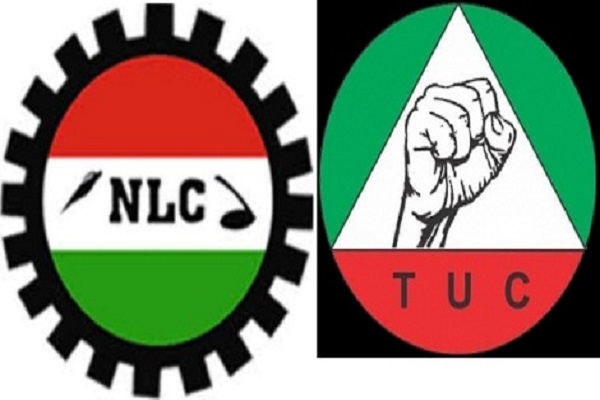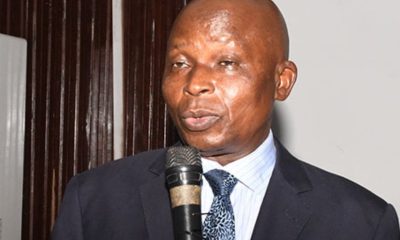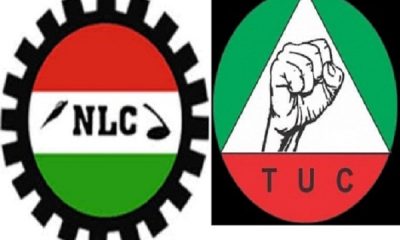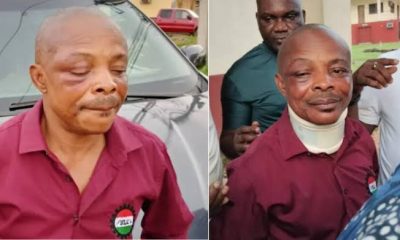Headline
What we expect of new Minister — Labour leaders

Two labour leaders on Sunday said the incoming Minister of Labour needed to empathise with workers, especially at a critical time where the economy was faced with challenges affecting them.
The leaders spoke in interviews with the News Agency of Nigeria (NAN) in Lagos, ahead of President Bola Tinubu’s swearing-in of new ministers on Monday.
The Chairman, Nigeria Labour Congress (NLC), Lagos Chapter, Mrs Funmi Sessi, expressed optimism in Mr Simon Lalong, assigned the portfolio of the Minister of Labour and Employment, to do well, given his experience.
Sessi said Lalong should use the experience he had garnered as a former governor of Plateau State to also deal with the issues of labour.
“The future is bright with labour and Lalong as the minister, all things being equal, if he will not change, and with the good industrial relationship that he maintained with the labour unions in his state.
“I hope he will extend it to the labour centres in Nigeria, including Nigeria Labour Congress, all workers, not only in the public sector, but private as well; both formal and informal.
” This is necessary so that we can have the working people in Nigeria partake in the same wealth that they create; it will be a commonwealth, and that is our hope, “ she said.
The labour leader said that the sector would need a minister with compassion, experience; one who was humane.
Sessi said, “Someone that will give all to ensure that he will create more ground for employment, productivity, high yield of productivity.”
Also, the Secretary, Trade Union Congress of Nigeria, Lagos State Council, Mr Aladetan Abiodun, said the new Minister for Labour would be facing an inherited tense industrial space due the fuel subsidy removal.
According to him, the removal has impacted negatively on all fixed income earners.
“I strongly believe that if this issue is not properly managed, it may snowball into full scale industrial crisis.
“It is precisely this reason that we want a minister who will hit the ground running.
“Also, we want the issue of the new minimum wage to be quickly settled; this is another area where we are going to need quick intervention.
“Furthermore, we hope under this new administration, the ministry of labour will wake up to some of its statutory responsibilities in the area of labour inspections.
“This includes bringing employers of labour who often breach their contract of agreement with employees to order, as well as ensuring that the laws of our land are respected, particularly by foreign companies who usually show utter disrespect to our labour laws, “ Aladetan said.
Headline
Fagbemi warns against obstructing EFCC from performing its lawful duty

The Minister of Justice, Lateef Fagbemi, SAN has warned against obstructing the Economic and Financial Crimes Commission (EFCC) from carrying out its lawful duty .
Fagbemi’s warning is contained in a statement in Abuja.
“This is a matter of very grave concern, it is now beyond doubt that the EFCC is given power by the law to invite any person of interest to interact with them in the course of their investigations into any matter, regardless of status.
“Therefore, the least that we can all do when invited, is not to put any obstruction in the way of EFCC, but to honourably answer their invitation.
“A situation where public officials who are themselves subject of protection by law enforcement agents will set up a stratagem of obstruction to the civil and commendable efforts of the EFCC to perform its duty is to say the least, insufferably disquieting’’.
He added that running away from the law will not resolve issues at stake but only exacerbate them.
“Nigeria has a vibrant judicial system that is capable of protecting everyone who follows the rule of law in seeking protection.
“I therefore encourage anyone who has been invited by the EFCC or any other agency to immediately toe the path of decency and civility by honouring such invitation instead of embarking on a temporising self-help and escapism.
“This can only put our country in bad light before the rest of the world’’.
He said institutions of state should be allowed to function effectively and efficiently.
“I stand for the rule of law and will promptly call EFCC, and indeed any other agency to order when there is an indication of any transgressions of the fundamental rights of any Nigerian by any of the agencies’’.
NAN reports that the EFCC had on Wednesday warned members of the public that it was a criminal offence to obstruct officers of the Commission from carrying out their lawful duties.
Section 38(2)(a(b) of the EFCC Establishment Act makes it an offence to prevent officers of the Commission from carrying out their lawful duties. Culprits risk a jail term of not less than five years.
The warning , the EFCC said, became necessary against the background of the increasing tendency by persons and groups under investigation by the Commission to take the laws into their hands by recruiting thugs to obstruct lawful operations of the EFCC.
On several occasions, the anti graft agency said, operatives of the Commission have had to exercise utmost restraint in the face of such provocation to avoid a breakdown of law and order.
Headline
Unknown Gunmen Abduct Channelstv Reporter In Port-harcourt

Some unknown gunmen have kidnapped Joshua Rogers, the ChannelsTV reporter in Port-Harcourt, the Rivers State capital.
Politics Nigeria learnt that Rogers was picked up close to his residence at Rumuosi in Port Harcourt and to an unknown destination by the gunmen around 9pm on Thursday, April 11.
The reporter was driving his official ChannelsTV branded car when the hoodlums accosted, pointed a gun at him and took him away in the same vehicle.
Rogers was said to be returning from his official assignment in Government House after a trip to Andoni for a government event when the incident happened.
Already, the gunmen were said to have contacted his wife and demanded a N30million ransom for bis release.
His cameraman confirmed the incident and appealed to his abductors to set him free unconditionally.
-

 Business5 days ago
Business5 days agoSeplat Energy celebrates a decade of Dual Listing with Bell Ringing Ceremony at Nigerian Stock Exchange
-

 News5 days ago
News5 days agoBDCs now buying dollar at ₦980 — ABCON President
-

 Metro5 days ago
Metro5 days agoOsun Poly Student, Olanrewaju Olatona killed by hit-and-run one-way driver
-

 Headline5 days ago
Headline5 days agoFagbemi warns against obstructing EFCC from performing its lawful duty
-

 News5 days ago
News5 days agoLASG’s maize palliative impactful, says poultry association chair
-

 News5 days ago
News5 days agoWoman killed while crossing road in Anambra








